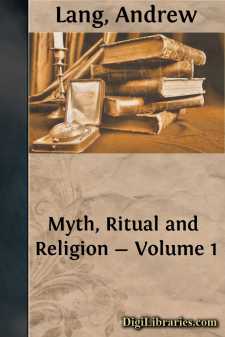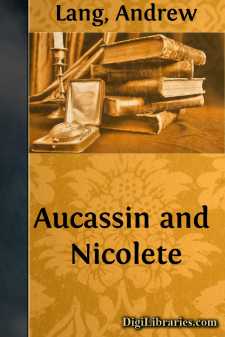Categories
- Antiques & Collectibles 13
- Architecture 36
- Art 48
- Bibles 22
- Biography & Autobiography 813
- Body, Mind & Spirit 142
- Business & Economics 28
- Children's Books 14
- Children's Fiction 11
- Computers 4
- Cooking 94
- Crafts & Hobbies 4
- Drama 346
- Education 46
- Family & Relationships 57
- Fiction 11829
- Games 19
- Gardening 17
- Health & Fitness 34
- History 1377
- House & Home 1
- Humor 147
- Juvenile Fiction 1873
- Juvenile Nonfiction 202
- Language Arts & Disciplines 88
- Law 16
- Literary Collections 686
- Literary Criticism 179
- Mathematics 13
- Medical 41
- Music 40
- Nature 179
- Non-Classifiable 1768
- Performing Arts 7
- Periodicals 1453
- Philosophy 64
- Photography 2
- Poetry 896
- Political Science 203
- Psychology 42
- Reference 154
- Religion 513
- Science 126
- Self-Help 84
- Social Science 81
- Sports & Recreation 34
- Study Aids 3
- Technology & Engineering 59
- Transportation 23
- Travel 463
- True Crime 29
Sort by:
by:
Andrew Lang
THE BOYHOOD AND PARENTS OF ULYSSES Long ago, in a little island called Ithaca, on the west coast of Greece, there lived a king named Laertes. His kingdom was small and mountainous. People used to say that Ithaca “lay like a shield upon the sea,” which sounds as if it were a flat country. But in those times shields were very large, and rose at the middle into two peaks with a hollow between...
more...
by:
Andrew Lang
CHAPTER I: ANCESTRY, BIRTH, EDUCATION, ENVIRONMENT: 1513(?)-1546 “November 24, 1572. “John Knox, minister, deceased, who had, as was alleged, the most part of the blame of all the sorrows of Scotland since the slaughter of the late Cardinal.” It is thus that the decent burgess who, in 1572, kept The Diurnal of such daily events as he deemed important, cautiously records the death of the great...
more...
by:
Andrew Lang
LOST LEADERS. SCOTCH RIVERS. September is the season of the second and lovelier youth of the river-scenery of Scotland. Spring comes but slowly up that way; it is June before the woods have quite clothed themselves. In April the angler or the sketcher is chilled by the east wind, whirling showers of hail, and even when the riverbanks are sweet with primroses, the bluff tops of the border hills are...
more...
by:
Andrew Lang
VII October 1882—August 1884 In the two years and odd months since his return from California, Stevenson had made no solid gain of health. His winters, and especially his second winter, at Davos had seemed to do him much temporary good; but during the summers in Scotland he had lost as much as he had gained, or more. Loving the Mediterranean shores of France from of old, he now made up his mind to...
more...
by:
Andrew Lang
PREFACE TO NEW IMPRESSION. When this book first appeared (1886), the philological school of interpretation of religion and myth, being then still powerful in England, was criticised and opposed by the author. In Science, as on the Turkish throne of old, "Amurath to Amurath succeeds"; the philological theories of religion and myth have now yielded to anthropological methods. The centre of the...
more...
by:
Andrew Lang
So much has been written on R. L. Stevenson, as a boy, a man, and a man of letters, so much has been written both by himself and others, that I can hope to add nothing essential to the world's knowledge of his character and appreciation of his genius. What is essential has been said, once for all, by Sir Sidney Colvin in "Notes and Introductions" to R. L. S.'s "Letters to His...
more...
by:
Andrew Lang
THE END OF PHÆACIA I. INTRODUCTORY. The Rev. Thomas Gowles, well known in Colonial circles where the Truth is valued, as “the Boanerges of the Pacific,” departed this life at Hackney Wick, on the 6th of March, 1885. The Laodiceans in our midst have ventured to affirm that the world at large has been a more restful place since Mr. Gowles was taken from his corner of the vineyard. The...
more...
by:
Andrew Lang
INTRODUCTION There is nothing in artistic poetry quite akin to “Aucassin and Nicolete.” By a rare piece of good fortune the one manuscript of the Song-Story has escaped those waves of time, which have wrecked the bark of Menander, and left of Sappho but a few floating fragments. The very form of the tale is peculiar; we have nothing else from the twelfth or thirteenth century in the alternate...
more...
by:
Andrew Lang
INTRODUCTORY: OF MODERN ENGLISH POETRY To Mr. Arthur Wincott, Topeka, Kansas. Dear Wincott,—You write to me, from your “bright home in the setting sun,” with the flattering information that you have read my poor “Letters to Dead Authors.” You are kind enough to say that you wish I would write some “Letters to Living Authors;” but that, I fear, is out of the question,—for me. A...
more...
by:
Andrew Lang
'Life is not all beer and skittles,' said a reflective sportsman, and all books are not fairy tales. In an imperfect state of existence, 'the peety of it is that we cannot have all things as we would like them.' Undeniably we would like all books to be fairy tales or novels, and at present most of them are. But there is another side to things, and we must face it. '"Life is...
more...











